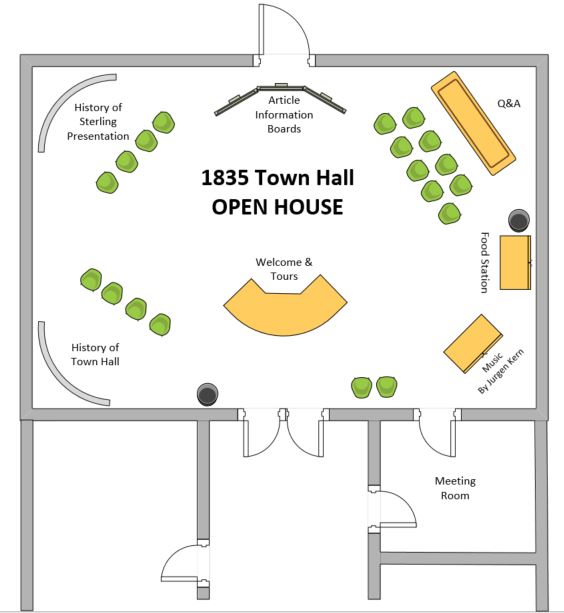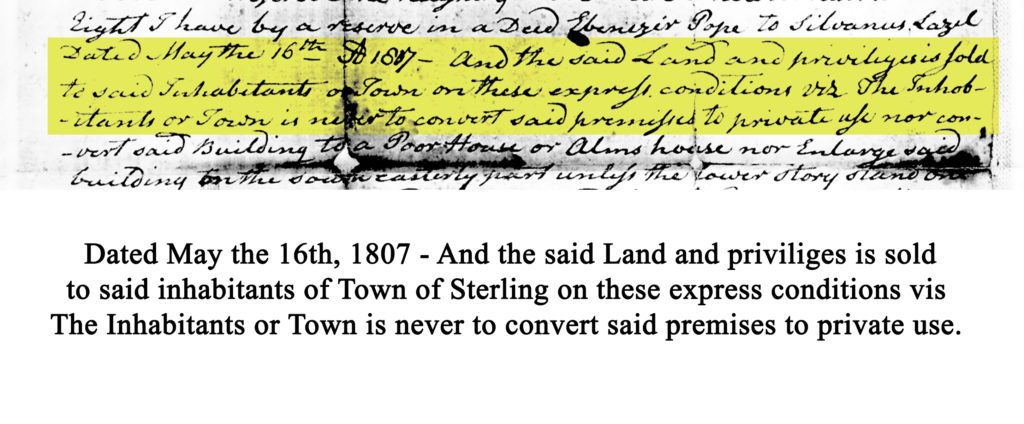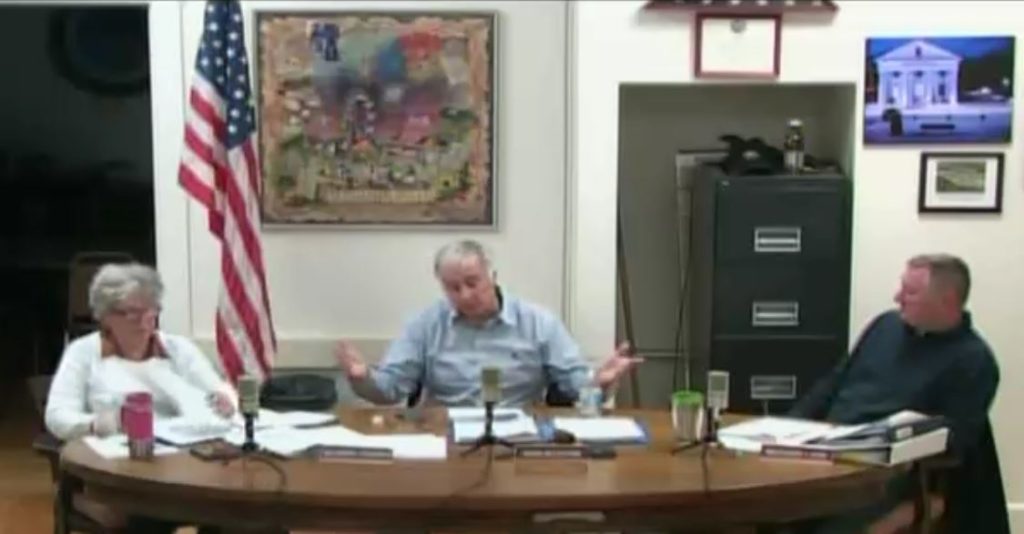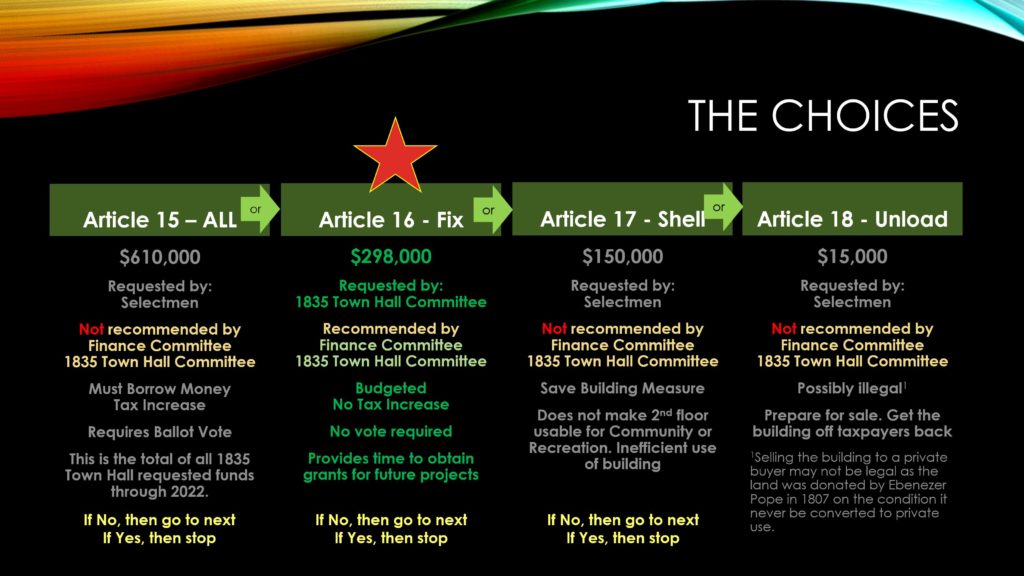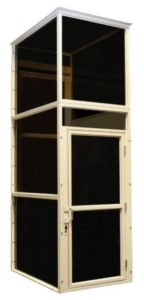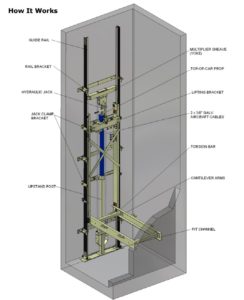Welcome to the ongoing saga surrounding the 1835 Town Hall and the efforts to affect needed repairs. Although the 1835 Town Hall Committee submitted an Article to repair structure and roof, the Board of Selectmen decided to move forward with four different and distinct Articles. This is not a simple decision. It takes time to unpack the meaning, intent and ramifications of each Article. The Finance Committee deliberated long and hard over each Article for weeks before they ultimately decided to support the Article the 1835 Town Hall Committee proposed. Article 2 below.
But first, a little background.
Background: The 1835 Town Hall is our Community Center (voted by majority in 2011) and is also home to our Recreation Department. It is used by more than a thousand people, children and adults, consistently throughout the year. Regular programs, classes, meetings and gatherings are scheduled in all available rooms. Private and public meetings are held in all rooms most afternoons and evenings. At the moment, we are unable to host groups in the Great Hall on the second floor until we resolve the roof and structural issues, insulate and finish the ceiling.
The Town Hall has not been renovated since the 1970’s when it was repurposed for Town Offices. Since that time, some crucial rehab has been performed. The 1835 Town Hall has been allotted $5,000 per year for general maintenance and cleaning. In the past decade, we have also had capital expenditures to replace oil furnaces, repair masonry, restore all windows and renovate the fire escape. The total cost for all maintenance and repairs has been about $100,000 over the last 10 years or about $10,000 per year on average. The operating costs for electricity, oil and water are roughly $7,300 per year. Think about your own home and the cost to maintain year-after-year and you will see the 1835 Town Hall building is extremely cost-effective.
Hosting the Recreation Department at the 1835 Town Hall is a win-win partnership with the Town Hall and Community Center. All scheduling is done through the Recreation Department and staff is available daily to answer questions and keep an eye on the facility.
As with all buildings, from time to time, repairs are needed. The roof of the Town Hall was last updated in 1893. It is remarkable to think that it has lasted virtually untouched for 124 years. Unfortunately, the cost of repairing a public building is staggering when compared to the cost of repairing your own home. As a public building, we are required to pay contractors prevailing wages which are two to three times what you might pay privately. There are insurance and bonding requirements that exceed private requirements. We must also provide testing and mitigation of asbestos, lead or other contaminants.
Our intent is to prepare the building for the next 50 or more years and in so doing, restore the vaulted ceilings in the Great Hall, provide modern lighting, updated insulation and finish the Great Hall to entice use by the public and rentals for private functions. Here are the specifics:
Our Plan
The 1835 Town Hall Committee has proposed a gradual rehabilitation plan for the Town Hall spanning 5-years, It starts with repairing the structural issues and the roof this year. This would require no tax increase for the property owners of Sterling. In subsequent years and with very strong opportunities for matching grant funding, it follows with septic, universal access, column rehabilitation and sprinkler system. You can read the details below in the Article we submitted to the Board of Selectmen; it is the 2nd Article: Fund 1835 Town Hall Roof Repairs Only – Fully Funded. This article falls within the scope of the Capital Budget and does not require borrowing.
This plan was submitted by and is recommended by the 1835 Town Hall Committee and after much thought, discussion and deliberation also recommended by the Finance Committee.
The Articles
ARTICLE 15
1st Article of 4:
Fund Major 1835 Town Hall Repairs; $610,000.
Submitted by the Board of Selectmen
Not Recommended by the Finance Committee
Not Recommended by the 1835 Town Hall Committee
1835 Committee will VOTE NO
$610,000 – This is the total of all the capital requests for the next 5-years. It includes the roof, the septic, the columns, universal access and a sprinkler system. It is too much to accomplish in one or two years. The 1835 Town Hall Committee does not recommend this item because it is too much, too soon. The Finance Committee agrees, but wants the voters to know that there will be a requirement to spend as much as $610,000 for all rehabilitation to the Town Hall but that does not account for any grant funding or other sources of funding. This Article asks for too much money too soon and does not account for the very strong opportunity for grant funding. With grant funding, we can reduce the complete project by as much as $150,000. The Committee needs time to obtain grants and properly manage the rehabilitation.
This item would also be funded with borrowed money and would require a Ballot vote to approve. The 1835 Town Hall Committee is not in favor of borrowing money.
ARTICLE 16
2nd Article of 4
Fund 1835 Town Hall Roof Repairs Only – Fully Funded $298,000
Submitted by the 1835 Town Hall Committee
Recommended by the Finance Committee
Recommended by the 1835 Town Hall Committee
1835 Committee will VOTE YES
$298,000 – We must make repairs to the structure and put on a new roof and in doing so, restore the Great Hall. We have presented a detailed capital request to the Finance and Capital Budget Committees and Board of Selectmen. We have already initiated meetings with the Massachusetts Architectural Access Review Board that has jurisdiction over universal access regulations and are preparing to apply for the appropriate variances in code and time required to begin the roofing project giving us time to provide universal access.
This plan which requires no tax increase and is within the Capital Budget allows us to make full use of the building for the Recreation Department plus civic, community and private events and functions. It will allow us to rent out space and generate revenue. It also provides the 1835 Town Hall Committee the time to seek out and apply for grant funding for the future projects reducing taxpayer costs.
Specifically, this project includes:
- Structural repairs; it is evident that major roof rafter beams are failing with extensive cracks and some breakage. The structure will need to be repaired from above and below. Repairs will include replacement or reinforcement of rafter beams, purlins and collar ties, possible installation of ceiling joists and/or trusses at the stage or last bay, replacement or updating of tie rods/cables, preceded by engineering planning and review.
- Plywood sheathing; The roof sheathing supporting the slate roof is 18″-24″ planking from the original 1835 structure and 1893 addition. It will need to be strengthened and made uniform. Plywood roof underlayment, followed by synthetic roof underlayment, and ice and water barrier in required areas.
- Architectural Asphalt Shingles; The Committee has opted not to replace the existing slate with new slate. Although historically proper and recommended by the Massachusetts Historical Commission, slate is extremely expensive (more than double the cost) and heavy (10 times heavier). Architectural Asphalt shingles emulating slate tiles is preferred for appearance, cost and reduced weight.
- Interior Insulation and Finish; The entire space above the new finished ceiling will have a continuous vapor barrier and fiberglass insulation applied, as required. Structural components will be encased to create architectural elements, gallery flooring and railings will be reinforced. Ceiling will be covered in gypsum. Walls will be finished and painted. Architectural elements will be stained and sealed.
- Electrical and Lighting; Electrical wiring for fire and heat sensor, smoke detectors and recessed LED lighting will be added to the ceiling along with electrical boxes for chandeliers which will be added at a later date. At present, we will reuse the existing six pendant mounted and hidden fixtures presently mounted above the hung ceiling.
- Design and Architect; Architect support is required to finalize the design elements, provide structural engineering support, interface with building inspectors, contractors, preparation of bid package, etc.
ARTICLE 17
3rd Article of 4
This year: Fund 1835 Town Hall Roof Repairs Only – Partially Funded – $150,000
Submitted by the Board of Selectmen
Not Recommended by the Finance Committee
Not Recommended by the 1835 Town Hall Committee
1835 Committee will VOTE NO
$150,000 – This Article would only repair the structural issues and roof, but it would not provide the second floor as a “usable space. This only repairs the building envelope. It does not make the 2nd floor usable. It obligates us to proceed with universal access requirements, but doesn’t give us a complete and useable building.
ARTICLE 18
4th Article of 4
Do Nothing: Prepare Building to Be Sold
Submitted by the Board of Selectmen
Not Recommended by the Finance Committee
Not Recommended by the 1835 Town Hall Committee
1835 Committee will VOTE NO
$15,000 – This article allows for minimal repairs of the 1835 Town Hall but more importantly legal efforts and Title search to see if it is even possible to convey or sell and authorizes the Board of Selectmen of Sterling to enter into agreements for the sale of the property.
This would be a travesty and if the property were to be sold to a private individual or corporation it would be converted to private use and that would defy the conditions of the Deed and very possibly illegal. The land on which the Town Hall stands was donated to the inhabitants of Sterling by Ebenezer Pope in 1807 with the condition that it never be converted to private use. It was intended to always be our Town Hall. This would also create yet another white elephant in the center of Sterling.
That said, we do not believe the Selectmen are intentionally contemplating any illegal actions.
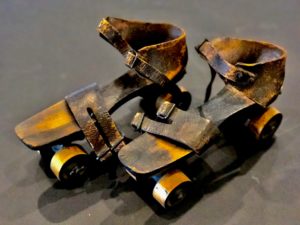 the Selectmen to open the hall for skaters using skates just like those pictured here with leather straps and wooden wheels. The Selectmen declined to give permission without a vote of the town because many were opposed fearing it would injure the floor for dancing. The article, in jest, suggested that might be a good thing.
the Selectmen to open the hall for skaters using skates just like those pictured here with leather straps and wooden wheels. The Selectmen declined to give permission without a vote of the town because many were opposed fearing it would injure the floor for dancing. The article, in jest, suggested that might be a good thing.
